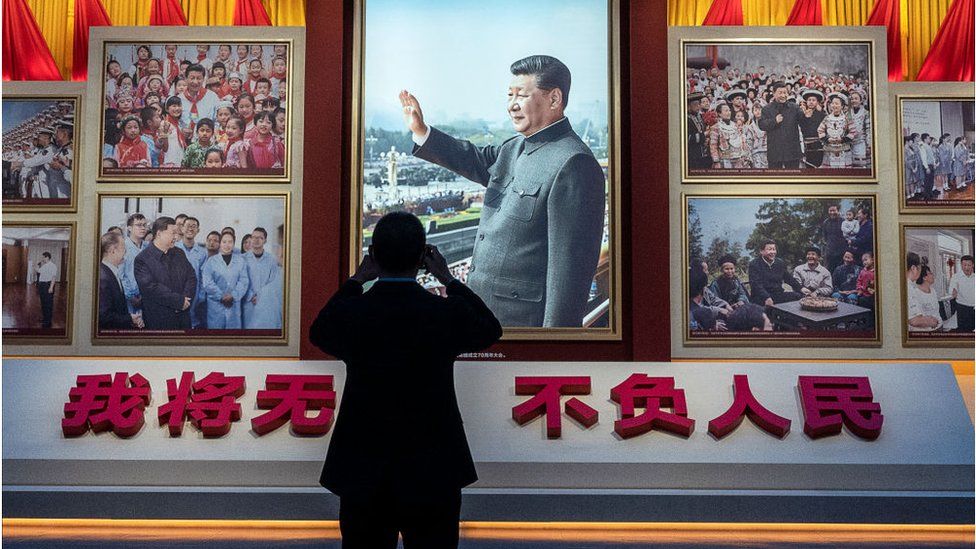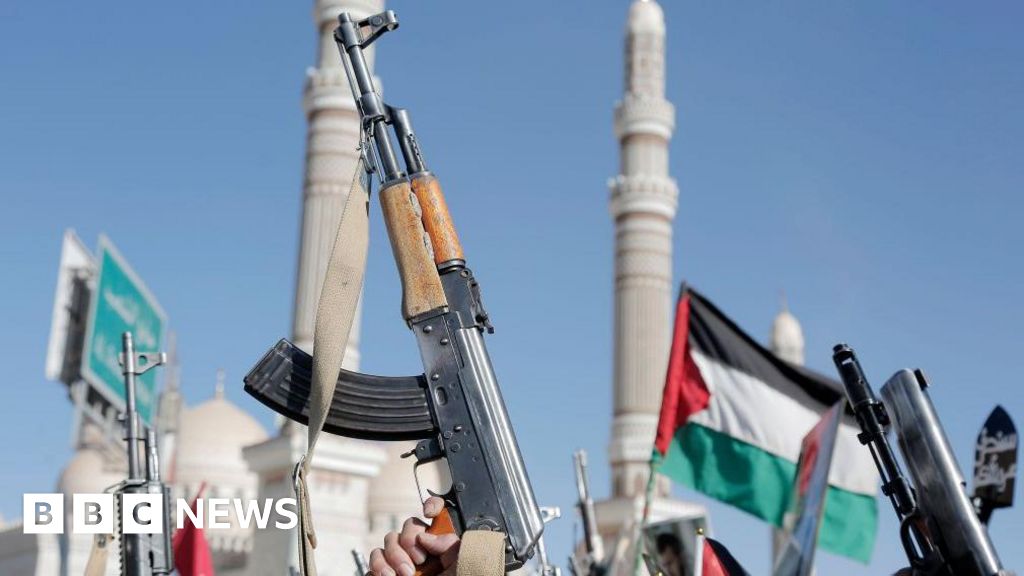ARTICLE AD BOX
 Image source, Getty Images
Image source, Getty Images
Mr Xi has increasingly styled himself as a Mao-like figure
By Tessa Wong & Stephen McDonell
BBC News, Singapore and Beijing
China's President Xi Jinping is expected to cement his grip on power as a historic Communist Party congress kicks off in Beijing.
In a break in decades-long tradition, delegates are likely to hand Mr Xi a third term as party chief.
It paves the way for him to become the most powerful leader since Mao Zedong.
About 2,300 delegates are meeting to elect party leaders and debate key policies, which may include China's controversial zero Covid strategy.
State media outlets have ramped up party propaganda in the lead-up to the week-long congress, with news coverage and TV shows highlighting China's achievements under Mr Xi's rule.
Amid the state fervour, Beijing has come under strict security measures and travel restrictions. It has sparked frustration in the city with a rare and dramatic public protest on Thursday criticising Mr Xi and zero Covid.
The policy has saved lives, but also exacted a punishing toll on the Chinese people and economy, and there is increasing public fatigue and anger over lockdowns and travel restrictions.
Mr Xi is expected to kick off the congress on Sunday with a long, formal speech using carefully chosen language, which analysts will be scouring for any hints of policy changes.
Delegates are also expected to elect various leaders including the Politburo Standing Committee - China's equivalent of a presidential cabinet - who will present themselves to waiting media during the congress.
In the past, the twice-a-decade congress was seen as a chance for leaders to promote their supporters, as they vied to increase the power of their factions within the party.
But observers say these days there appears to be only one faction at the 20th Party Congress - that of Mr Xi.
In a clear sign of this consolidation of power, top Chinese Communist Party (CCP) leaders released a communiqué days earlier endorsing him as "the core" of the party and leadership. They also called for the party to unite even more closely behind him.
Mr Xi currently holds the three most powerful positions in China - general secretary of the CCP, chairman of the country's armed forces and president. He is expected to renew his term for the first two titles at the congress.
The CCP does not set any term limits. But no leader besides Mao, the founder of communist China, has ever served a third term.
The presidency also used to have a two-term limit in the country's constitution, put in place by reformer Deng Xiaoping to prevent the rise of a Mao-like figure.
But Mr Xi has managed to eliminate this requirement: in 2018 China's rubber-stamp parliament abolished the rule, effectively allowing him to remain president for as long as he likes.
Since taking power in 2012, Mr Xi has led China on a path that has been equal parts ambitious and authoritarian.
He has pushed for "a great rejuvenation of the Chinese nation", which saw him pursuing economic reform, reducing pollution and alleviating poverty.
Is Xi Jinping's poverty-busting "potato miracle" all that it seems
He has also launched an anti-corruption campaign - which many saw as a way for him to rid his political enemies - as well as crackdowns on the Uyghurs in Xinjiang and pro-democracy protesters in Hong Kong.
But Mr Xi continues to face a multitude of challenges, such as youth unemployment, a slowing economy and the ongoing property crisis - and of course zero-Covid.
"The question is whether during the congress we may see some statement saying, 'We've done well, we can move away from that now'," said Professor Rosemary Foot of Oxford University.
"The idea that the party has achieved victory and controlled the virus, that is an important message to send domestically and internationally."
But she added all signs currently point to a likely continuation of the policy.
Many will also be watching the congress to see if there will be any alteration to Beijing's foreign policy, especially towards the world's other superpower, the US.
Mr Xi's attempts to expand China's influence abroad through the One Belt One Road programme and claims in the South China Sea, as well as its support of Russia in the Ukraine war, have raised tensions with the US and other countries.
Under his direction China has also taken a more assertive position on Taiwan, a self-ruled island which Beijing views as part of its territory.
With Mr Xi remaining at the helm all these will continue to be core interests - though some experts believe he may temper China's approach in some aspects to pursue better trade relations with the US and regional partners.
"The CCP's political legitimacy lies in socioeconomic delivery," said Dr Collin Koh of Singapore's S Rajaratnam School of International Studies.
"The average Chinese citizen will feel that things are not going very well, so there's a need to reinvigorate the kind of growth China has been more used to in recent decades

 2 years ago
32
2 years ago
32








 English (US) ·
English (US) ·